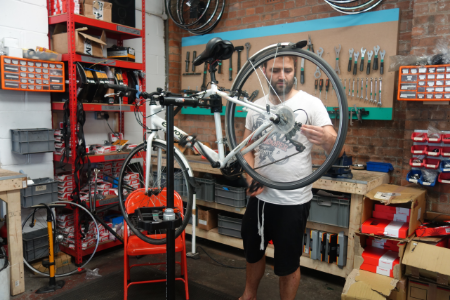
The Bike Project was set up in 2013 with the mission to take second-hand bikes, fix them up, and donate them to refugees and asylum-seekers.
Life in London is extremely tough for refugees. Every year 13,500 asylum seekers arrive in London, but claiming asylum can take years, during which time asylum-seekers are forbidden to work and receive just £36 a week to live. This coupled with the cost of public transport in London means many refugees are unable to access essential services, and are at risk of social isolation.
The Bike Project believes that no person should have to choose between eating a meal and catching a bus, which is why the programme was created: to support refugees and asylum seekers by donating refurbished bikes. As well as the refurbished bike, all beneficiaries of the project also receive a cycling and road safety session. However, the Bike Project found that many individuals still lacked the confidence to cycle independently on receiving the bike. Therefore, they were missing out on many of the economic and social benefits of using a bike regularly.
Thus Bike Buddies was launched, a pilot programme which received funding from Cycling Grants London for three years, helping refugees to feel more confident when cycling on London roads. Bike Buddies matches up a refugee cyclist with a volunteer, or ‘buddy’, from their local area. The buddy will then help beneficiaries to build up their confidence by sharing their knowledge of local short-cuts / less busy roads, teaching about safer routes, and indicating where local services are located; particularly low-cost or free facilities.
The Buddy Coordinator will match the volunteers with a refugee based on their location, gender (if requested), interests and general compatibility. Following their first ride together, both volunteer and refugee will be contacted by the Buddy Coordinator for feedback. They will also be encouraged to use the Bike Buddy App to report on their rides – when they met, how far they cycled, how they would rate the experience etc.
A successful buddy partnership will meet a minimum of three times. However, it is envisioned that many Bike Buddy relationships will blossom into long lasting friendships. The scheme is designed to encourage refugees and asylum seekers to get to know their city, and to cycle for longer periods of time. To support this, the project offers its volunteers expenses to cover a modest lunch for the pair to enjoy together.
The concept of the Bike Buddies pilot programme is to support refugees and help them to build cycling into their lives once they have received a bike; encouraging them to stay motivated and experience the many benefits of cycling. Through the cycling trips which the volunteers and refugees share together confidence will be built, knowledge of road cycling improved, isolation reduced, well-being improved and the possibilities of social integration encouraged.
The Bike Project said that if they were to give advice to similar projects they would say: “when running a pilot project, it’s much better to work with a small sample of people where you can really measure the impact. That way, you can really focus on understanding what is working and what isn’t before you scale it up. It’s much harder to do this with a large number of participants, as more of your resources are spent on running the programme, and less on measuring it”.
A refugee who participated in the Bike Buddies programme said: “I thank my mentors so much. They are really good; they have given me more confidence. In the beginning before we cycle, we talk, we do exercises, always happy and smiling. I have made a lot of friends. Kids are jealous of my bike! They say 'Oh mommy I need to get one’. My friends see me happy and now they know about the lessons hopefully they will come too. I tell them: if I can, you can”.
Jem Stein, Founder and CEO, The Bike Project: “The Bike Buddies pilot programme has been a great success and we are already seeing the impact on refugees and volunteer participants alike. The willingness of CGL to fund innovative and impactful, but as yet untested projects, helps to create a diverse and welcoming cycling environment that will help more people from all backgrounds enjoy the benefits of cycling.”